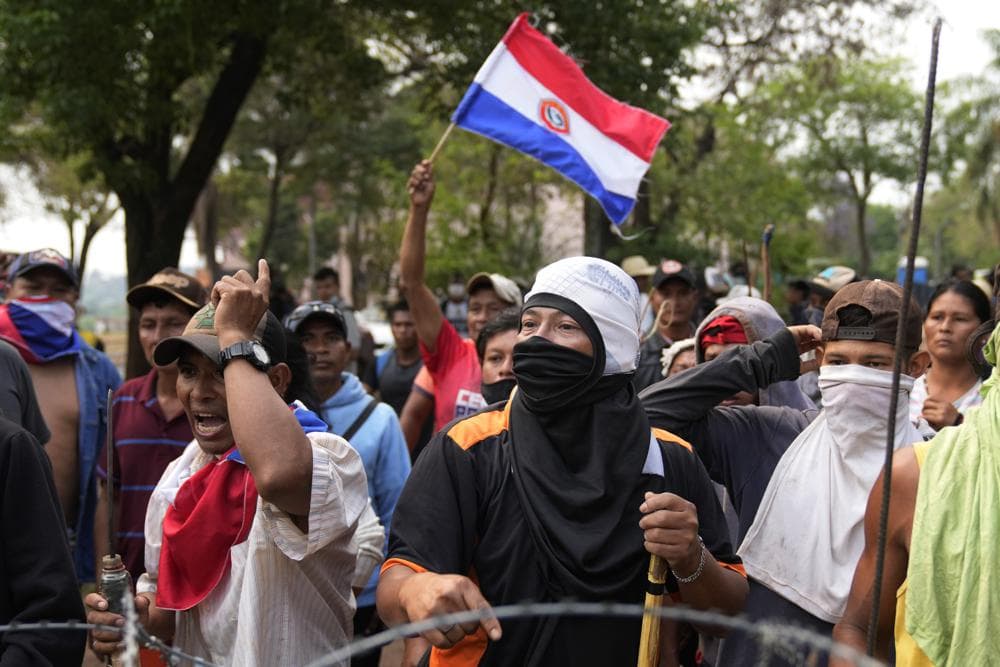Church activists are warning that land disputes involving large land owners and indigenous peoples have become more and more common in Paraguay.
Over the past few months, there has been a dramatic rise in the number of communities evicted from their traditional lands by the police, at times without due process.
Activists say a law passed Sept. 30, 2021, which increases the penalties for “land invaders,” has further criminalized indigenous peoples fight for their traditional territories.
“There was much pressure for land in October and November because that is when planting begins. The problem will go on until the end of February, because it is the time of late planting,” said Father Enrique Gaska, who heads the National Coordination of Indigenous Pastoral (CONAPI), the Catholic entity which works with the Paraguayan indigenous population.
The number of indigenous people in the South American country is estimated to be 130,000, out of a total population of over 7 million. Part of their groups live in the Chaco, a predominantly dry region, which is of no interest to most of the nation’s farmers.
“But in the East, where the country’s most fertile soil is found, the Guarani population has been harassed by ranchers who want to occupy its territories. At times they do not have the regular ownership of the lands,” Father José Arias, who works with indigenous peoples in Benjamín Aceval in the Chaco, told Crux.
According to indigenous leader Bernarda Pesoa, a member of Conamuri – an organization of indigenous and peasant women – large soy companies are behind the evictions of communities in the eastern part of Paraguay.
“Our struggle for our lands is permanent. The law used to protect us, but now we are completely abandoned by the State,” she told Crux.
Pesoa, a member of the Qom people, noted that a large march organized by indigenous organizations in December of 2021 gathered thousands of people from different parts of the nation in Asunción.
“In March, we will organize a new massive demonstration in the capital,” she added.
Italian-born Father José Zanardini, an anthropologist who has been working with Paraguayan indigenous peoples since the 1970s, said the new law as an attack on indigenous rights.
“Since its approval, there have been violent actions against some communities. It is all unconstitutional. The Paraguayan Constitution determines that the State must provide lands to the indigenous peoples, so they can keep their traditional way of living,” he told Crux.
He said that lawyers connected to the Church have been taking legal measures to assist evicted communities. Catholic movements have been helping indigenous groups who had to move to urban areas.
“Unfortunately, most of the Congress is connected to agribusiness. They do not have any desire to give more lands to the indigenous peoples,” he added.
Arias explained that the situation of most indigenous groups is particularly challenging now. Besides the land disputes, most of them have been facing terrible economic conditions due to the COVID-19 pandemic.
“Many used to have temporary works in farms and have not been hired over the past two years. The State did not give any response to that situation. The Social Pastoral Ministry is their only hope,” he said.
Gaska, from Conapi, said that the episcopate’s statements on the new law have brought public attention to the issue.
At the end of November, the bishops released a public letter to the Paraguayan congress demanding “respect to the native peoples’ rights and to the laws that regulate them.”
“We would like to express to you our deep concern with the forceful evictions and the threats of expulsion of indigenous and peasant communities in different zones of the country,” the statement read.
The bishops said that they were “outraged” by the recent evictions, so they decided to “ask the national authorities to take precautions to secure the native peoples’ rights in our country and the right to land of our fellow countrymen.”
A few days later, Bishop Ricardo Valenzuela of Caacupé said during his homily that it was necessary to “evaluate the derogation of the recent change in the Penal Code (the criminalization of land occupation) or its revision with [the inclusion of] a mechanism of control and dialogue,” according to local news website Ultima Hora.
The bishops’ declarations were criticized by Senator Fidel Zavala, one of the proponents of the new law. He said during an interview to a radio station that “it is serious that the Church is giving substance to attempts of whitewashing misdeeds like invasion.”
“The Church cannot be manipulated. Political problems must have political solutions,” he said, according La Nación.
Pesoa said it was fortunate the indigenous communities have the bishops’ and CONAPI’s support. “But the Congress simply does not listen to them,” she said.
Gaska said he does not think that the law can be changed until March, since Congress is currently in recess.
“But it is absolutely necessary that before each eviction all State branches discuss it with the communities involved,” he said.
All those attacks have at least strengthened the indigenous organizations, claimed Zanardini.
“My impression is that there has been an internal maturation and new leaders have emerged, including very skilled women that have been wisely guiding their communities,” he said.













